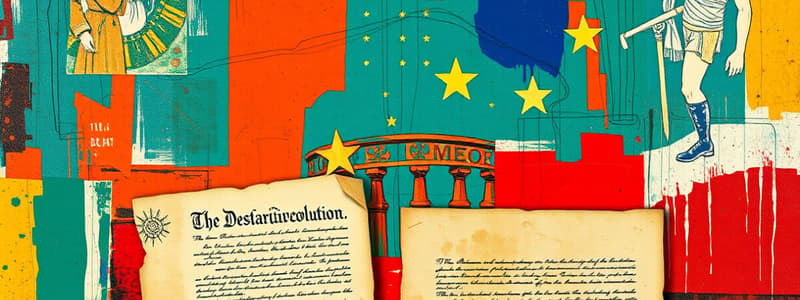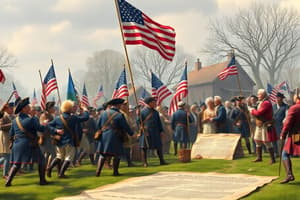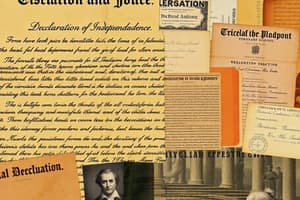Podcast
Questions and Answers
What was the significance of the Battle of Saratoga during the Revolutionary War?
What was the significance of the Battle of Saratoga during the Revolutionary War?
The Battle of Saratoga was significant because it marked a turning point in the war, leading to France formally joining the conflict as an ally of the United States.
Describe the primary purpose of the Olive Branch Petition sent to King George III.
Describe the primary purpose of the Olive Branch Petition sent to King George III.
The primary purpose of the Olive Branch Petition was to express the colonists' desire for reconciliation and a peaceful resolution to their grievances with Britain.
What was Thomas Paine's argument in 'Common Sense' regarding British rule?
What was Thomas Paine's argument in 'Common Sense' regarding British rule?
In 'Common Sense', Thomas Paine argued for the American colonies' independence from British rule, emphasizing the need for self-governance.
How did the Articles of Confederation create challenges for the new United States?
How did the Articles of Confederation create challenges for the new United States?
What impact did Thomas Jefferson have on the Declaration of Independence?
What impact did Thomas Jefferson have on the Declaration of Independence?
What was the significance of the Siege of Yorktown in the context of the Revolutionary War?
What was the significance of the Siege of Yorktown in the context of the Revolutionary War?
What did the Treaty of Paris of 1783 achieve for the United States?
What did the Treaty of Paris of 1783 achieve for the United States?
Who were the Loyalists during the Revolutionary War, and what challenges did they face?
Who were the Loyalists during the Revolutionary War, and what challenges did they face?
What was Abigail Adams' main message in her letter to John Adams in 1776?
What was Abigail Adams' main message in her letter to John Adams in 1776?
How did the Articles of Confederation limit the power of the central government?
How did the Articles of Confederation limit the power of the central government?
Flashcards are hidden until you start studying
Study Notes
Lexington and Concord
- First military engagements of the American Revolution occurred in April 1775.
- British troops aimed to seize colonial weapons, leading to armed conflict with colonists.
Olive Branch Petition
- Peace proposal sent by the Second Continental Congress to King George III in 1775.
- Intended to reconcile and settle grievances peacefully but was rejected by Britain.
Thomas Paine - Common Sense
- Influential pamphleteer during the American Revolution.
- "Common Sense," published in 1776, advocated for American independence, significantly impacting public opinion.
Thomas Jefferson and the Declaration of Independence
- Principal author of the Declaration of Independence.
- Adopted by the Continental Congress on July 4, 1776, it declared the colonies' independence and outlined principles of freedom and equality.
Articles of Confederation
- First constitution of the United States adopted in 1777.
- Created a weak central government with limited powers, reflecting fears of centralized authority.
Revolutionary War
- Armed conflict between American colonies and Great Britain from 1775 to 1783.
- Resulted in the colonies gaining independence and forming the United States.
Saratoga
- A significant American victory during the Revolutionary War in 1777.
- Considered a turning point because it led to France formally joining the conflict as an ally.
Yorktown
- The final major military engagement of the Revolutionary War, occurring in 1781.
- American and French forces, under General George Washington, besieged and defeated British General Cornwallis, leading to British surrender.
Paris Peace Treaty of 1783
- Formally ended the Revolutionary War.
- Signed in Paris, it recognized U.S. independence from Great Britain and established new national boundaries.
Loyalists
- American colonists who remained loyal to the British Crown during the Revolutionary War.
- Often faced persecution and had to flee to British-held territories.
Abigail Adams - "Remember the Ladies"
- Wife of John Adams, she advocated for women's rights in her letters to her husband.
- Her famous phrase "Remember the ladies" highlighted the early push for gender equality.
Republicanism
- Political ideology stressing the importance of elected representatives making decisions for the people.
- Played a significant role in shaping the American government system.
Articles of Confederation - Limited Power
- Established a decentralized government with minimal powers.
- Aimed to coordinate efforts among the states rather than exert centralized control.
Land Ordinance of 1784 and 1785
- Laws governing the settlement of western lands acquired post-Revolutionary War.
- Set a system for surveying and selling public lands in the Northwest Territory.
Albany Congress/Albany Plan of Union
- A 1754 meeting of colonial representatives during the French and Indian War.
- Proposed by Benjamin Franklin to create a unified colonial government, but was not adopted.
Iroquois Confederation
- Alliance of Native American tribes, notably the Mohawk, Oneida, Onondaga, Cayuga, and Seneca.
- Played a key role in colonial diplomacy and relations with European powers.
Seven Years War/French and Indian War
- Global conflict (1756-1763) with North American battles known as the French and Indian War.
- Increased tensions between American colonies and Great Britain.
Peace of Paris of 1763
- Treaty that ended the Seven Years War.
- Resulted in British control over Canada, Florida, and other territories, impacting colonial relations.
Pontiac’s Rebellion
- Armed conflict (1763-1766) between Native tribes and British colonists in the Ohio River Valley.
- A response to British policies and mistreatment of Native Americans after the Seven Years War.
Proclamation of 1763
- British decree that prevented colonial settlement west of the Appalachian Mountains.
- Aimed to avoid conflicts with Native Americans and maintain control over western territories.
Sugar Act (Revenue Act of 1764)
- British law imposing taxes on sugar and imports into the American colonies.
- Part of Britain's strategy to raise revenue from colonies post-war.
Writs of Assistance
- Legal documents allowing British officials to search for smuggled goods without specific warrants.
- Viewed as an infringement on colonial rights and liberties.
March of the Paxton Boys (1764)
- Uprising by Scots-Irish frontiersmen in Pennsylvania protesting Native American attacks.
- Highlighted discontent with the colonial government's response to frontier violence.
Regulator Movement
- Series of protests in North and South Carolina during the 1760s by backcountry farmers.
- Aimed at securing fair taxation and better representation in colonial governance.
Stamp Act (1765)
- British law taxing printed materials in the American colonies.
- Sparked widespread dissent and protest among colonists, contributing to the revolutionary sentiment.
Studying That Suits You
Use AI to generate personalized quizzes and flashcards to suit your learning preferences.




